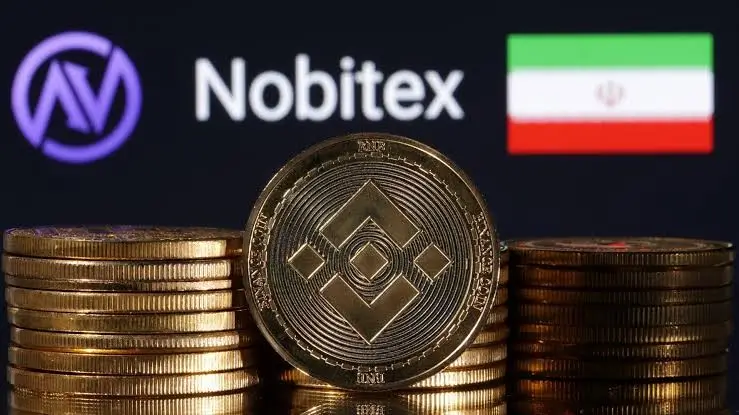Iran’s largest crypto exchange, Nobitex, has suffered a devastating $100 million digital asset theft—sparking swift and severe action from Tehran. Authorities have imposed what is now being dubbed a “crypto curfew”, severely limiting blockchain activity across the country.
The move underscores mounting anxieties around cybersecurity in crypto, particularly in regions where regulatory oversight remains fragile. For Iran, this breach may mark a turning point in how it approaches blockchain governance and digital asset protection.

Iran Imposes Crypto Curfew Following $100M Nobitex Hack ( Image Source: CNBC )
Nobitex Hack Triggers Shockwaves
As Iran’s leading crypto platform, Nobitex plays a central role in the nation’s digital finance ecosystem. The platform now finds itself at the centre of a major crisis after blockchain investigators flagged suspicious wallet activity linked to it.
Over $100 million in assets were siphoned off to unidentified wallets, raising alarms across the Iranian crypto landscape. Though Nobitex has yet to issue a detailed report, sources indicate that the hack affected multiple blockchain networks, exposing potential weaknesses in the exchange’s architecture and internal safeguards.
Iran’s Response: The Birth of a Crypto Curfew
In reaction, Iranian authorities swiftly enacted a crypto curfew, effectively restricting domestic access to major blockchain networks and digital wallets.
Internet Service Providers (ISPs) have reportedly been ordered to throttle or block traffic tied to decentralised platforms, especially those believed to have been involved in the breach. Several websites and IPs associated with cryptocurrency activity are now under strict surveillance or outright bans.
While this crackdown is said to be temporary, it reveals how aggressively Iran is prepared to act when faced with large-scale crypto platform breaches.
Iranian Crypto Exchange Nobitex Reportedly Exploited For $73M
Iran’s largest cryptocurrency exchange, Nobitex, has confirmed a major security breach that resulted in a loss of nearly $73 million from its hot wallets.
The platform disclosed the incident in a Telegram post… pic.twitter.com/K0LEWZZJpN
— CrowdFundJunction (Crypto VC) (@cfjcrypto) June 19, 2025
Investigations Hint at Insider Threats
Early analysis of the hack has prompted speculation about possible internal collusion or a massive security lapse within Nobitex. The methodical transfer of funds—executed over several hours—suggests that conventional detection protocols were either absent or ignored.
Experts have flagged the broader issue of cybersecurity in crypto exchanges within Iran. Unlike exchanges in more heavily regulated environments, Iranian platforms may lack both the technical capacity and legal frameworks to prevent or respond to such incidents.
Some even suggest that Iran’s regulatory agencies themselves are ill-equipped to monitor the fast-paced evolution of blockchain technologies and digital crimes.
The Fallout: Users Lose Confidence
While the financial loss is staggering, the real damage may be reputational. Iranian crypto users, many of whom relied on Nobitex for daily transactions, are feeling betrayed and exposed.
Social media platforms like Telegram and X (formerly Twitter) are flooded with users demanding answers and accountability. Many have begun pulling funds from smaller platforms, fearing they could be next.
“There’s no trust left,” said one trader from Tehran. “We used Nobitex because it felt local and secure. Now, everything’s uncertain.”
Crackdown or Catalyst for Reform?
Iran’s new stance raises crucial questions: will this curfew lead to reform and better protection, or simply stifle growth and innovation in the sector?
The government argues the move is essential to “clean up the space”, but critics warn that blunt-force tactics risk pushing crypto activity further underground. Developers, miners, and investors—already operating under heavy economic sanctions—may view this as yet another hurdle to legitimate participation in global digital finance.
Without a clear path forward, many fear that Iran’s blockchain crackdown will do more harm than good.
Also Read: Pudgy Penguins Launches Skill-Based Web3 Game ‘Pengu Clash’ on Telegram’s TON Blockchain
A Global Wake-Up Call
The Nobitex crypto crime is a stark reminder that even leading exchanges can be vulnerable. In emerging markets, where regulatory clarity and enforcement are still evolving, the risk of major breaches remains high.
Crypto platforms worldwide are now on high alert. Iran’s experience could well prompt new international standards around compliance, internal auditing, and real-time risk monitoring—especially in countries where state involvement in the digital economy is growing.
Final Thoughts
The Iran crypto curfew is more than a knee-jerk reaction—it marks a defining moment in the country’s approach to blockchain governance.
Whether it leads to robust regulatory reform or drives the industry into further obscurity will depend on what happens next. One thing is certain: for users and platforms alike, the need for transparency, accountability, and security has never been clearer.
In the volatile world of crypto, trust isn’t just important—it’s everything.

